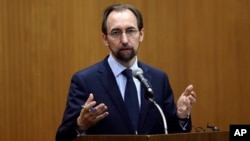The United Nations High Commissioner for Human Rights Thursday responded to North Korea’s threats against the Seoul-based U.N. office mandated to investigate abuses in the North.
Investigators working in the newly established office are expected to build upon a U.N. report issued last year documenting a network of political prisons in North Korea and atrocities that include murder, enslavement, torture, and rape.
North Korea through its state-run media threatened to retaliate against South Korea for opening the U.N. office that it calls intended to “incite confrontation” and “spoil North-South relations and invite a war.”
Zeid Ra'ad Al-Hussein, the U.N. Human Rights High Commissioner, criticized Pyongyang's efforts at intimidation.
“Any threats from a member state of the United Nations against a U.N. entity is something deeply regrettable and unbecoming of that member state,” he said.
The U.N. General Assembly overwhelmingly passed a resolution to refer North Korea to the International Criminal Court for crimes against humanity, but the process was stalled in the U.N. Security Council. It has not been brought to a vote there because it is believed that Pyongyang’s allies Beijing and Moscow would veto any punitive action.
But Al Hussein says the U.N. will continue to work to highlight the dire human rights situation in North Korea and pressure the Kim Jong Un regime to change.
“The fact that this U.N. human rights office in Seoul is now a reality and will start fully operating in a month or so is a sign that the commission’s work is starting to bear fruit," he said.
At the same time, he says, engagement with the North to improve human rights conditions is also their goal.
In what was widely seen as an act of retaliation against Seoul for supporting U.N. human rights efforts, Pyongyang Tuesday sentenced two South Koreans to hard labor for life. The pair — a former missionary and a businessman — were arrested and accused of spying for the South's intelligence agency after entering the North through the Chinese border.
North Korea’s Committee for the Peaceful Reunification said in a statement that South Korean President Park Geun-hye will have to “entirely take the blame for all the ensuing catastrophic consequences in the North-South relations from this moment on."
Pyongyang also this week announced it would boycott next month's World University Games in South Korea to protest the opening of the U.N. human rights office in Seoul. South Korea’s Unification Ministry called the North’s threats against the South “deplorable."
At least in the short term, Seoul’s support for investigations into human rights violations committed by the Kim Jong Un regime will likely further strain inter-Korean relations.
South Korea halted most economic assistance and imposed sanctions against North Korea in 2010 after Seoul accused Pyongyang of sinking a South Korean warship and killing 46 sailors. North Korea has denied any involvement in the attack.
President Park Geun-hye has called for unconditional talks with the North focusing on issues of mutual concern to rebuild trust, like arranging reunions for families that have been separated since the end of the Korean War in the 1950s.
North Korea, however, set pre-conditions that must be met before it will agree to any new talks. These include ending joint military drills with the United States and blocking activists in the South from sending balloons full of anti-regime information into the North.
International negotiations to end North Korea’s nuclear program also remain deadlocked. On this issue the U.S. and South Korea have set pre-conditions demanding Pyongyang live up to past agreements and take action to curb its ongoing nuclear development operations before they agree to talks.
The U.N. High Commissioner for Human Rights did not only criticize North Korea, he also spoke out against South Korea’s national security law that he says overly restricts freedom of speech and expression. He also spoke in support of South Korea’s comfort women who are demanding an apology and compensation from Japan for being forced into prostitution during World War II.
VOA Seoul Producer Youmi Kim contributed to this report.





